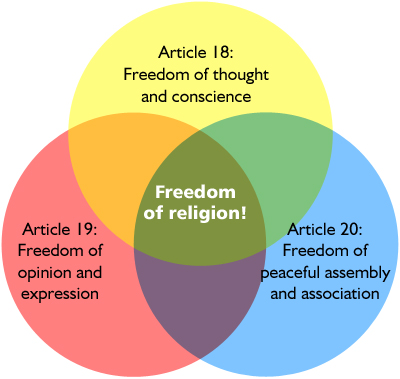 The Universal Declaration of Human Rights is a document to help and support mankind. And all those countries who have signed this declaration are duty-bound, morally and legally, to abide to all articles, clauses and regulations stipulated in this declaration. The very first article of this declaration speaks that ‘all human beings are born free and equal in dignity and rights’. That is to say that each and every single human being irrespective of colour, faith and politics has the right of freedom, equality, dignity and liberty. And that freedom should not be compromised and ignored by any member state of the United Notations.
The Universal Declaration of Human Rights is a document to help and support mankind. And all those countries who have signed this declaration are duty-bound, morally and legally, to abide to all articles, clauses and regulations stipulated in this declaration. The very first article of this declaration speaks that ‘all human beings are born free and equal in dignity and rights’. That is to say that each and every single human being irrespective of colour, faith and politics has the right of freedom, equality, dignity and liberty. And that freedom should not be compromised and ignored by any member state of the United Notations.
This wonderful document duty-bounds all those nations and states, who have signed and endorsed this valuable document, to follow all its articles including 18, which states: ‘Everyone has the right to freedom of thought, conscience and religion; this right includes freedom to change his religion or belief, and freedom, either alone or in community with others and in public or private, to manifest his religion or belief in teaching, practice, worship and observance.’ This article not only speaks about the free choice of religion, but also, clearly endorses the freedom to change any religion without any fear and punishment.
But, very unfortunately some Muslim-majority countries, despite the fact that they are the members of United Nations and have signed this document, impose the death penalty on those who disbelieve Islam and convert to any other religion. Recently, an Iranian court sentenced to death a Christian Pastor Yousef Nadarkhani, born in Muslim family, for apostasy. This case was appealed in the Supreme Court of Iran which ordered to retrial the case.
The irony is that there are many ordinary Muslims as well as their leaders and clerics who agree that a fellow Muslim who changes or abandons his or her faith should be hanged. And many even speak loudly, publicly also in media declaring those who change their faith liable to death.
Pastor Nadarkhani was arrested in October 2009 and has been held in Lakan Prison, Rasht, since being declared guilty of apostasy in September 2010. Nadarkhani was told that the death sentence would be annulled if he recanted his faith and returned to Islam. In appeal hearings, however, the pastor has refused to give up his Christian faith.
I believe that Nadarkhani should not have to pay any price for his freedom of faith; instead he should be released immediately and should be free to practice any faith he wishes. It is extremely amazing and frustrating that how can these Iranian (or any other Muslim) clerics enforce someone to believe in the religion they have chosen for themselves with their free will. Isn’t this so strange that when God did not force anyone to believe in any religion and declared ‘there should be no compulsion in religion’ and these clerics are imposing their ideas on others and are depriving others from their freedom and free will.
The Iranian courts are not only violating laws of their country as their being no such crime under Iran’s penal code, and their religion but they are also violating the international law. Their acts are also in violation of the ‘Universal Declaration of Human Rights’, the document Iran has signed and is duty-bound to abide by all its articles, morally and legally; and is a grave injustice. So, we appeal and call upon the Iranian government to stop itself from such injustices and violation of human dignity, rights and freedom and to release Pastor Yousef Nadarkahni and honour his freedom and liberty.
(By: Laiq Ahmed Atif – amjmalta@gmail.com ; laiqatif@gmail.com)

Pingback: Apostasy and UN Declaration of Human Rights